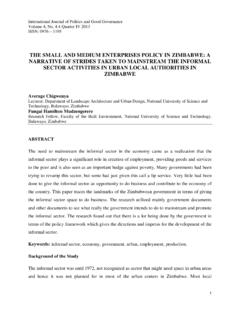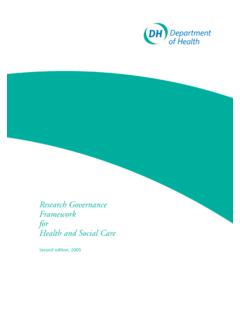Transcription of A good practice guide to whistleblowing policies
1 Corporate Sector Corporate Sector good good practice practice guide guide A good practice guide to whistleblowing policies This document forms part of the Corporate Sector good practice guide , which is a central database comprising analytical tools, case studies, documented procedures and template policies representing good practice '. The distinguishing feature of the guide is that it aims to provide practical tools to help people with their day-to-day work. Organisations of all sizes have contributed, including Australia's top 20 corporations, regulatory bodies and individual members.
2 It can be accessed online at: The good practice guide is Copyright CPA Australia. Please refer to our Terms of Use: Corporate Sector good practice guide A good practice guide to whistleblowing policies A whistleblowing policy is increasingly seen to be a critical element of the internal control system and corporate governance of organisations whether operating in the corporate, public or voluntary sectors. A number of jurisdictions, such as the US, UK and Australia, have introduced and enhanced the legislative protection for whistleblowers. Many codes of corporate governance now recommend the implementation of whistleblowing policies .
3 For example, the UK Combined Code on Corporate Governance (2005) recommends that audit committees ensure that there are arrangements in place for employees to confidentially raise concerns about possible improprieties in matters of financial reporting or other matters, and to ensure that arrangements are in place for the independent investigation of such matters and for appropriate follow-up action. The ASX Council's Principles of good Corporate Governance and Best practice Recommendations state that companies should have a code of conduct to enable employees to alert the management and the board to potential misconduct in good faith, without fear of retribution, and that this code should require recording and investigation of such alerts.
4 This reference covers the major issues that should be considered in developing a whistleblowing policy. The reference is organised into a series of questions covering why, who, what and how. A. WHY? Why is a policy necessary? The whistleblowing policy should include a statement to explain the rationale for having it. Possible reasons include: a) L egal requirements. US companies often make references to clauses in the Sarbanes-Oxley Act of 2002 (SOX) in their whistleblowing policies . In contrast, even though there is a Public Interest Disclosure Act (1998) (PIDA) in the UK covering whistleblowing , UK organisations tend not to make reference to the PIDA.
5 B) Compliance with internal code of conduct or ethics policy. c) Part of risk management to protect the organisation's long-term wellbeing and reputation. Note: While organisations may wish to refer to legislative requirements relating to whistleblowing , a whistleblowing policy should ideally not be merely a response to regulatory requirements. B. WHO? Who can be a whistleblower? There are different types of persons who can be whistleblowers and therefore covered by the policy. These persons can be broadly classified as internal (employees, contract workers, vendors, etc.) or external (customers, members of the public etc.
6 The policy should clarify if it is strictly meant as an internal policy or whether the policy also covers outsiders or third parties. Note: Legislation (such as SOX) in certain countries protects only internal whistleblowers in public companies. While, ideally, a whistleblowing policy should be extensive in terms of persons covered, organisations will need to consider their ability to effectively implement such a comprehensive policy. More extensive coverage would also entail wider dissemination of the policy. Corporate Sector good practice guide A good practice guide to whistleblowing policies Who to make the disclosure to?
7 A whistleblower policy may cover internal and/or external persons to whom disclosure may be made. Internal persons may include the following: Line manager CEO/CFO. Head of HR. Head of internal audit Company secretary or legal counsel Designated ethics officer Board audit committee or chairman of audit committee Note: Line management is generally perceived as less independent. Although line managers can be included as potential recipients of disclosures, the policy should include persons who are likely to be seen as more independent of management. The policy should also require all complaints to be documented.
8 The board of directors, or a board committee such as the audit committee, should be kept informed of complaints and their investigation. The chairman of the audit committee or another designated independent director should always be one of the persons to whom a disclosure can be made. External persons may include the following: Company-appointed whistleblower service provider ethics hotline Company-appointed external lawyer Independent, external organisation providing free advice on whistleblowing Public Concern at Work in the UK. Regulatory bodies or equivalent, including the police Media Note: It is not recommended that the whistleblowing policy prohibits or strongly discourages employees from raising concerns to external parties, such as the regulatory bodies or the media.
9 The policy should not be seen as an attempt by the organisation to circumvent disclosures to regulatory bodies because, in some cases, such disclosures may be justified (such as tax fraud or software piracy). Some organisations, in their policy, encourage complainants to consider raising concerns internally first. One UK company includes the following in their policy: In considering taking a concern outside the Company, you should be aware of your duty of confidentiality and you should consider whether reporting the concern externally, without first giving the Company the opportunity to look into the matter, is the reasonable course of action.
10 Another UK company states, It would not normally be appropriate to disclose your concerns to a third party outside the company unless you have first followed the procedures in this Policy.. However, one UK company says that: Whilst internal disclosure is encouraged at all times, an employee may be of the view that there is an exceptionally serious issue which warrants reporting to an external body. This disclosure must be made in good faith and not for the purpose of personal gain. Corporate Sector good practice guide A good practice guide to whistleblowing policies Who is responsible for following up and investigating when a disclosure has been made?









